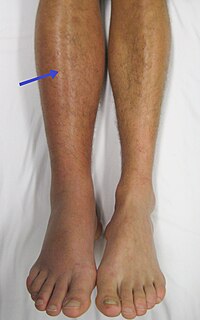
Photo from wikipedia
Background Elevated International Normalized Ratio (INR) is a marker of coagulopathy, but its impact on outcomes following mechanical thrombectomy (MT) in patients with stroke is unclear. This study investigates the… Click to show full abstract
Background Elevated International Normalized Ratio (INR) is a marker of coagulopathy, but its impact on outcomes following mechanical thrombectomy (MT) in patients with stroke is unclear. This study investigates the impact of mild INR elevations on clinical outcomes following MT. Methods In this retrospective cohort study, consecutive patients with stroke treated with MT were identified from 2015 to 2020 at a Comprehensive Stroke Center. Demographic information, past medical history, INR, National Institutes of Health Stroke Scale score, use of tissue plasminogen activator, and last known normal to arteriotomy time were recorded. Outcome measures included modified Thrombolysis in Cerebral Infarction (mTICI) score, modified Rankin Scale (mRS) score at 90 days, and intracerebral hemorrhage (ICH). Patients were divided into two groups: normal INR (0.8–1.1) and mildly elevated INR (1.2–1.7). Results A total of 489 patients were included for analysis, of which 349 had normal INR and 140 had mildly elevated INR. After multivariable adjustments, mildly elevated INR was associated with lower odds of excellent outcomes (mRS 0–1, OR 0.24, p=0.009), lower odds of functional independence (mRS 0–2, OR 0.38, p=0.038), and higher odds of 90-day mortality (OR 3.45, p=0.018). Elevated INR was not associated with a higher likelihood of ICH, and there were no differences in rates of HI1, HI2, PH1, or PH2 hemorrhagic transformations; however, elevated INR was associated with significantly higher odds of 90-day mortality in patients with ICH (OR 6.22, p=0.024). This effect size was larger than in patients without ICH (OR 3.38, p<0.001). Conclusion In patients with stroke treated with MT, mildly elevated INR is associated with worse clinical outcomes after recanalization and may worsen the mortality risk of hemorrhagic transformations.
Journal Title: Journal of NeuroInterventional Surgery
Year Published: 2022
Link to full text (if available)
Share on Social Media: Sign Up to like & get
recommendations!